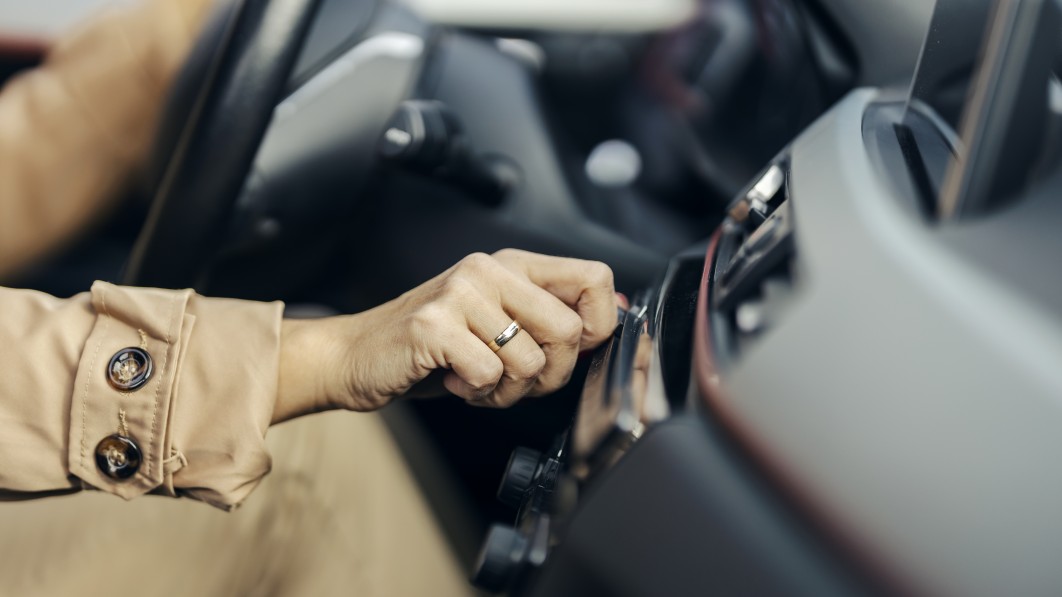![Pioneering Director Cheryl Dunye On The Watermelon Woman & The Compulsion To Make Art [Exclusive Interview] – /Film Pioneering Director Cheryl Dunye On The Watermelon Woman & The Compulsion To Make Art [Exclusive Interview] – /Film](https://www.slashfilm.com/img/gallery/groundbreaking-filmmaker-cheryl-dunye-talks-the-watermelon-woman-and-the-compulsion-to-make-art-exclusive-interview/l-intro-1688762145.jpg)
Pioneering Director Cheryl Dunye On The Watermelon Woman & The Compulsion To Make Art [Exclusive Interview] – /Film
When /Film put together our list of the 100 Best Films Ever Made, Cheryl Dunye’s “The Watermelon Woman” was an immediate contender. A groundbreaking work of queer cinema and the first feature film directed by an out Black lesbian, “The Watermelon Woman” remains a seminal piece of the New Queer Cinema movement and the so-called “controversy” (see: conservative moral panic) changed the way the National Endowment for the Arts would award grant money forever. Before crafting her debut feature, Dunye made a name with her “Dunyementaries,” a filmmaking style that blended autobiographical narratives with documentary fiction. Her work often dissected themes of sexuality, race, the American white supremacist society, and the intersectionality of lesbian relationships.
Now, more than 25 years after the release of “The Watermelon Woman,” mainstream cinema seems to have finally caught up with what so many of us have known the whole time: Cheryl Dunye is brilliant. I was fortunate enough to speak with her ahead of the film’s new director-approved special edition Blu-ray from the Criterion Collection, and we discussed the film’s longevity, how TikTok is influencing the future of storytelling, and why it’s more important than ever to make deeply personal art.
Note: This interview has been edited for clarity and brevity.
The longevity of The Watermelon Woman
 Criterion
Criterion
“The Watermelon Woman” is having a mini resurgence right now as younger generations are discovering the film through the Criterion Release, and the name-drop on “Yellowjackets” certainly didn’t hurt.
Right?
Did you ever imagine that the film was going to have the longevity that it has?
Yes, no, maybe. Putting yourself out there in media, it’s almost like people posting something to their Insta or TikTok and getting hits. It’s not exactly the same, but it could be the same for people taking that courage to get outside of themselves. But who knows what’s going to happen after that? Will you get hooked to that and start your own thing as an influencer, or do you say “I want to go on and tell bigger stories and tell another story?” So that’s how it was for me back then, and then take away all the technology.
Go way, way back in the scene where there was no ability to do any of the things that we’re able to do with technology. Like, you could write a song, you could dance, you could make a film, you could possibly do that on video, but you wouldn’t be valued the same way if you did it on Hi8, Super-8. There’s all these kinds of lo-fi commercial formats, and then there was Hollywood. I think things are changing and they’ve changed. So I had no idea then that what I was doing out here is still there. I think it’s still there.
But I think what’s happened to the center or the smaller part that wasn’t there for me or didn’t know has mushroomed out a bit to see me. Because I was always there, boo. That’s all that I keep saying. People are like, “Oh my God, you’re a discovery!” Whatever. Boo, I never left. You’re just finding me now. You know what I’m saying? I was always here. I’ve been hustling forever.
So it feels good. The hustle’s always still in me to make work. I’m doing more episodic television and I’m getting dropped in shows. One part of me is like, “Well, everybody’s redoing themselves, maybe it’s time to do the work on myself, too.” And then the other thing is like, “This gives me the ability to tell other people’s stories, or option books and do what I want to do in narrative or a doc or something.” So it’s given me an agency that I always had, but it feels good to have it now when so many more people are aware and so many gens have been influenced by it.
On the evolution of storytelling
 Criterion
Criterion
I first discovered your work at a Blockbuster in my small town. I couldn’t believe they had it.
Wow.
Yeah! It’s been really interesting now to see more people are, like you said, discovering it and it’s like, that’s a movie I watched when I was in high school and it changed my life. And now it’s like, welcome to the party!
Right? Right? Come on, now!
I like that you also brought up the internet and TikTok, because so much of your work incorporates autobiographical elements and now we have this whole new landscape where we can peek into the lives of people that aren’t in our direct community that we might not have ever known otherwise. Do you have any thoughts on that?
I think it’s that people are having and putting their lives out there so freely, so importantly, I guess people want to feel like they’re a part of something. And for me, doing that then was wanting to feel a part of something. The bigger community of storytelling and wanting to put a lens on what I thought was something. So I guess maybe I’m an OG of it and it has a different credibility because it happened on a different medium, an analog at another time, and I’m still here. But I think the ability to create, as I call it, create your own Hollywood, create your own universe of productivity. And that’s what feels good to me, that people are able to do. People who look like me, queer people of color, of having businesses, and more work, and leading the way. People are just able to have a universe of a culture that sustains them. So that’s really what’s exciting to me and brings me onto the same — I’m happy to skate in the same arena with everybody to do that.
On making queer films outside of coastal cities
 Criterion
Criterion
I love that so much. So I’m also deeply interested in the relationship that artists have to the environments in which they develop their art. And in “The Watermelon Woman,” Philly gets to be its own character. I’d love to just hear you speak on that.
Right. Right. Well, Philly has been the home of so much culture. Queer culture, to boot. People don’t even know that. And then so much to me as myself as an individual that, “Why not?” This is rich to me, it was the perfect place to bring to life. All the way back to the city that people escaped slavery and were free citizens in Philadelphia. And that history, going back to the Black churches, and museums, and places where Black people could be free.
I want to be in a community in a city that gives me agency. I can see people like myself who have agency, who are able to walk, who are making work, who are tipping their hat, doing their thing. And I’m tipping my hat back because we are all productive in that bubble of life. So Philly was the one that did it for me. I knew those streets. I worked at McGlinchey’s, the Irish Pub with punk rockers and serving green beer for $1.25 a mug or whatever. I rode a bike messenger. The city fed those stories. So I had to pay homage to that part of me. The cheesesteak in me. And boy, did I have a lot of cheesesteaks in me [laughs]. And I want one now!
I have such an affinity for films, especially queer films, that are set outside of the major New York, L.A. sort of metropolis because I’m a Midwest kid by way of Chicago and Cleveland. So seeing queerness exists in a world that is not New York or L.A. is always very, very exciting.
Yep! And I live in Oakland right now. I’m trying to do the same to set stuff up here. I mean, we’re only 45 minutes on a plane, six hours away from L.A., but everybody’s like, “Whoa, where are you?” Oh my God. I’m like, “Right here!” And there’s such, I mean, this is a great Chocolate City, very much like Philly. Lot of politics, Black Panthers, whatever’s here, tons of stuff. Boots Riley, who just popped out this week with his “I’m a Virgo.” So we’re collaborating, trying to get a thing called Cinemama up here that’s going to be something for the Bay Area filmmakers to support them. So Boots, I, and a few other folks are kicking off ways to make it vital for filmmaking to happen outside of those bubbles. And I’ve hosted a Happy Hour. Boots showed some work and other people’s work at the Grand Lake Theater a couple of weeks ago. So we’re on a path to making other places tell stories and have stories to tell.
A message to artists in a hateful world
 Criterion
Criterion
Looking back at everything that went down with “The Watermelon Woman” and the NEA and all that, I think in hindsight, it’s really easy to be like, “Okay, well these are just prudish, racist, sexist, homophobic losers.” That’s an easy thing to do. But at the same time, in our current landscape, we’ve got legislators that are doing book bans. You can’t even talk about the existence of queerness in some places. So I’m curious, what advice would you have for artists today who are trying to create and tell stories in the face of just this outright bigotry, which obviously has always existed but is really, really loud right now?
That you’re not alone in that journey. Don’t forget about the postal system. You can send a card out every day, and that’s an exhibit right there. Just know the worth of your journey and make something out of it. If you don’t have a camera or a phone … you can draw, and do it every day. Like, draw the same tree but with different feelings, and strokes, and emotion, then put it all up on a wall. If you do have a phone or a camera or are able to get out of your bubble, communicate. Show up in places where there is freedom and tell your story and find somebody else afterward to chat with, but do something.
I think that the numbing, the AI of it all is not good, but it also is this moment to be good by not letting those demons control us and take away what’s left of us. So just again, pick up something again that you haven’t done and complete it. And then you’ll be able to do it again. But finish it. It’s also about finishing. Walk to the door, open it, walk through, and there’s another door. And you’ll have to keep walking. If not, you’ll just be sitting on the couch, not engaging in whatever you’re in, whatever art.
And you’re not alone. There’s a community. If there’s none there, make it. But you have to open your mouth and get outside of your head. I think that’s the hardest thing for younger people today, because they’re so in their head this way, and there’s lots of identities with all the websites, and games, and whatever. It’s like, “Well, who am I?” Well, let’s live, and let’s explore one part of myself and show up for it in the flesh. So I think that’s the important thing: Be expansive.
“The Watermelon Woman” special edition Blu-ray is available starting today through The Criterion Collection.














